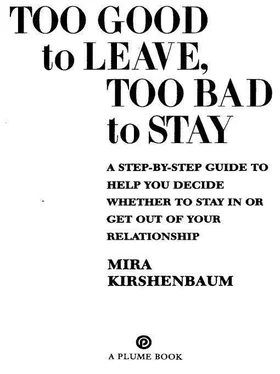Kirshenbaum, Mira - Too Good to Leave, Too Bad to Stay
Здесь есть возможность читать онлайн «Kirshenbaum, Mira - Too Good to Leave, Too Bad to Stay» весь текст электронной книги совершенно бесплатно (целиком полную версию без сокращений). В некоторых случаях можно слушать аудио, скачать через торрент в формате fb2 и присутствует краткое содержание. Жанр: Психология. Описание произведения, (предисловие) а так же отзывы посетителей доступны на портале библиотеки ЛибКат.
- Название:Too Good to Leave, Too Bad to Stay
- Автор:
- Жанр:
- Год:неизвестен
- ISBN:нет данных
- Рейтинг книги:3 / 5. Голосов: 1
-
Избранное:Добавить в избранное
- Отзывы:
-
Ваша оценка:
- 60
- 1
- 2
- 3
- 4
- 5
Too Good to Leave, Too Bad to Stay: краткое содержание, описание и аннотация
Предлагаем к чтению аннотацию, описание, краткое содержание или предисловие (зависит от того, что написал сам автор книги «Too Good to Leave, Too Bad to Stay»). Если вы не нашли необходимую информацию о книге — напишите в комментариях, мы постараемся отыскать её.
Too Good to Leave, Too Bad to Stay — читать онлайн бесплатно полную книгу (весь текст) целиком
Ниже представлен текст книги, разбитый по страницам. Система сохранения места последней прочитанной страницы, позволяет с удобством читать онлайн бесплатно книгу «Too Good to Leave, Too Bad to Stay», без необходимости каждый раз заново искать на чём Вы остановились. Поставьте закладку, и сможете в любой момент перейти на страницу, на которой закончили чтение.
Интервал:
Закладка:
Diagnostic question #35. Do you currently share goals and dreams for your life together?
Before you respond, let me give you some examples of the kind of answers I’m talking about.
• For one couple their mildly retarded, physically handicapped child was their joint project—caring for him, teaching him, and helping him live.
• Another couple was together because of a shared vision of living in the country and building their own house, growing their own food, and supporting themselves by the sweat of their brows, all in the context of being part of a close-knit community.
• For another couple it was both being surfers, and whatever else they did to earn a living really wasn’t important as long as they both could get away whenever possible to catch the best wave at the best beach.
• For another couple it was being conservative, born-again Christians, praying every day, being active in the church, educating their children at home, and working hard through political action to make the country more reflective of their values.
• For another couple it was being artists together. One supported himself painting full-time, and the other taught art for a living, but they mutually supported and stimulated each other.
• For another couple it was their garden. Not just keeping it up the way most people with a house do, but building it into one of the noteworthy gardens in their state.
• For another couple it was building together a stock market portfolio and getting it big enough as quickly as possible to allow them both to live off the income and enjoy themselves.
• For another couple his political career was their joint dream and project.
• For another couple building a computer software company into a nationwide powerhouse within its niche kept them together through years of difficulties.
It doesn’t have to be a noble vision or a vision that anyone else would share. But I am talking about couples for whom having a relationship is about more than just having a relationship. One reason so many Hollywood couples break up, even though they’re sincerely in love when they come together, is that their focus on their separate careers, while not being bad in itself, means they don’t have any shared vision.
At the same time, I don’t want to make it sound as though these shared dreams and goals have to be anything extraordinary. For a lot of people it can simply be to own a house and have a family and friends and put aside enough money to enjoy their retirement. It’s not an issue of how special the dream is but whether it has special power to hold you together.
Couples who’ve got this superglue run into difficulties like everyone else. They hurt each other and disappoint each other.
They have trouble communicating and subject each other to their personality defects like everyone else. They’re even subject to certain problems other couples don’t face, like the discouragement and mutual blame that follow when they run into obstacles pursuing their joint vision. And they even fall into relationship ambivalence like everyone else.
But their joint vision keeps them going and gives them a strength and focus the rest of us lack. Here’s the guideline:
GUIDELINE #35
If you and your partner share a goal or a dream for the future, if there’s something you organize your lives around and care about more than almost anything else, and if it’s something you do together in some way that not only gives you a sense of satisfaction but a sense of meaning, then for most people in your situation what you’ve got going for you means your relationship is too good to leave. Quick take: Sharing a passion makes it easier to share a life.
It Doesn’t Have to Be Anything You Do
What I’m really talking about here is people who feel there’s a special reason why they’re together. It helps if you can point to some project or activity you share, as with so many of the couples I’ve just listed. But that’s not absolutely necessary. Anything that gives you a sense of why you’re together qualifies.
For some couples it’s a special sense of fit. There’s a special way you’re weird and a special way your partner’s weird and there’s something about your joint weirdness that fits perfectly that means you feel you’d be miserable with anyone else. It could be something as simple as loving to stay up all night. It could be a negative, cynical kind of intelligence that takes pleasure in demolishing icons and pretensions. It could even be a strange way one of you is methodical and the other is creative and yet you somehow enhance each other.
As long as it’s sincerely and deeply felt, it could even be a semimystical sense that you belong together, that you were meant to be together, that even if you hadn’t met the accidental way you did you’d have somehow met some other way.
And what if you don’t have any of this? What if you had to say no to question #35? Don’t worry about it. People who are up the tree of love without any superglue are just as happy as everyone else. Having a special shared dream or goal doesn’t actually make couples happier than couples who don’t have it. If you’re in love and you like each other and you enjoy each other, who cares if you don’t give a damn about anything else?
It’s just that for people in an iffy relationship, having a special sense of belonging can be powerful evidence your relationship is too good to leave. If you don’t have it, though, it can still be too good to leave.
STEP #36: THE LAST STEP
We’re almost done. By now you’ve seen all the special issues that people have taught me it’s important to focus on in deciding whether to stay or leave. This last step, where we are now, isn’t really an issue at all. It’s just a question, a last important question you need to ask yourself:
Diagnostic question #36. If all the problems in your relationship were magically solved today, would you still feel ambivalent about whether to stay or leave?
Just think about what you’re really answering with this question, if you haven’t gotten clarity up until now. You’ve already read through thirty-five guidelines that point to all the important factors that make people happy they stay or leave. Your responses to the questions didn’t indicate that you have any of the problems that make people in general happy they left and unhappy they stayed. So if your answer to question #36 is yes, then that really means that even without the presence of the relationship-destroying problems other people face, you still feel iffy. And that’s very significant. Here’s the guideline:
GUIDELINE #36
Even if there were no problems, if you still don’t know whether you want to be in this relationship, then you’re indicating a deep discomfort with something about your partner or your relationship. People who felt this way were happy they left and unhappy they stayed. Quick take: If you don’t know whether you want to stay even if nothing were wrong, then you don’t want to stay.
A clear yes means this relationship is too bad to stay in. If your answer’s no—“No, if all the problems in my relationship were solved, I’d want to stay in it”—that means this relationship is too good to leave.
That’s it. Your answer to this question was either yes or no. You’ve found the clarity you were looking for.
HOME AT LAST
Well, here we are. That’s some journey we’ve been on together. I’m sure it’s been an emotion-filled journey, too. At the beginning you were stuck, unable to decide what to do with your iffy relationship. You were looking for evidence that would show you once and for all whether you should leave or stay. And now you’ve found it. Depending on your answer to any of the questions, a guideline might have told you clearly that based on your answer you’ll be happiest leaving because most people who gave that answer were happy leaving.
Читать дальшеИнтервал:
Закладка:
Похожие книги на «Too Good to Leave, Too Bad to Stay»
Представляем Вашему вниманию похожие книги на «Too Good to Leave, Too Bad to Stay» списком для выбора. Мы отобрали схожую по названию и смыслу литературу в надежде предоставить читателям больше вариантов отыскать новые, интересные, ещё непрочитанные произведения.
Обсуждение, отзывы о книге «Too Good to Leave, Too Bad to Stay» и просто собственные мнения читателей. Оставьте ваши комментарии, напишите, что Вы думаете о произведении, его смысле или главных героях. Укажите что конкретно понравилось, а что нет, и почему Вы так считаете.












